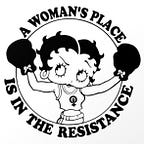Marlene Dietrich — The Blonde Venus
This is a guest post written by Letícia Mubárack and originally published in Portuguese here.
Marlene Dietrich was one of the most famous actresses from the Golden Age of Hollywood. She was in her most successful moment during the 1930s and 1940s. She was also a brave woman and an important political figure: as a German, during World War II, she stood against Nazism and supported the Allies. Bold, she was one of the first women to go out in public wearing pants, and became a fashion icon for the ages.
Born in Berlin in 1901, Marlene Dietrich started her acting career at age 20. She was in minor productions and worked as a singer, and then she did the film that would be her first big hit, and make her known worldwide: “The Blue Angel” (Josef von Sternberg, 1930). Her performance as Lola Lola, a singer that ruins a teacher’s life, opened the Hollywood doors to her. The famous scene in which she sings “Falling in Love”, showcasing her long legs, is considered one of the most memorable scenes in film history.
Her partnership with Sternberg (who was also her lover) lasted for seven films. The first one the duo made in Hollywood was “Morocco” (1930), in which Marlene acts alongside Gary Cooper, and for this movie she received her only Oscar nomination.
Other successes followed, like “Shanghai Express” (1932) and “Blonde Venus” (1932). In this last one, Helen (Dietrich) has to work in a cabaret in order to pay for her husband’s medical care. There she meets a millionaire (Cary Grant) and falls in love with him. In many of her movies, Dietrich uses her beautiful voice in musical numbers that exude sex appeal, and it happens again in this film: when she sings “Hot Voodoo”, the actress evokes the mystical side of her charm.
Bisexual, Marlene attracted the attention of both men and women. Throughout her career, she shaped the image of a seductive androgynous goddess with an aggressive sexuality and dominant attitude: her characters know no boundaries when they fall in love. Borrowing male outfits, she often dressed herself with a suit and a top hat. She was equally comfortable wearing glamorous dresses. Always worried about her appearance, she used her clothes as a weapon to conquer both the film partner and the audience.
“The Devil is a Woman” (1935) marks the end of her partnership with Sternberg, and Marlene starts successful collaborations with other Hollywood directors, making films like “The Garden of Allah” (1937), “Angel” (1937), “Destry Rides Again” (1939) and “Manpower” (1941).
In 1933, Hitler invited her to be the star in pro-Nazi films. She refused the offer and, in 1937, becomes an American citizen. Against Nazism, during World War II she helps the Allied troops, visits hospitals on the front and entertains soldiers with special performances. She received medals and honors in the US, but was considered a traitor in her homeland.
In 1961, Marlene stars in the antifascist film “Judgement at Nuremberg”. In 1975, she retires from the stages. Her last work at the movies was in “Just a Gigolo”, a 1978 film starred by David Bowie. Vain, she didn’t let herself be filmed or photographed by anyone as she got older, and lived in reclusion in France until her death in 1992. Even though there was still resentment, her body was buried in Berlin, as she had wished.
Her legacy remains: Dietrich is a film icon and evokes boldness, sex appeal and mystery. She influenced fashion and still is a reference for many singers and actresses.
According to the biographer Werner Sudendorf:
“There is a fascination for Marlene Dietrich because she always polarized people and was always provocative. She will always be a 20th century icon. She influenced fashion, was courageous. Marlene was an actress, a singer and a reluctant political hero. She was a microcosm of German-American history in the last century”.
